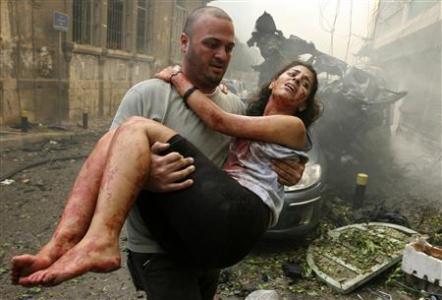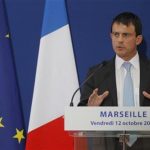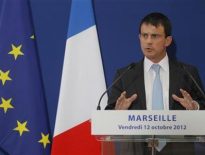(Reuters) – A prominent Lebanese intelligence official opposed to President Bashar al-Assad was killed in a huge car bomb in Beirut in another sign that Syria’s civil war is dragging its volatile neighbor into the conflict.

Wissam al-Hassan, who led an investigation that implicated Syria and Hezbollah in the assassination of former prime minister Rafik al-Hariri, and seven other people were killed when the bomb exploded in central Beirut on Friday afternoon.
Hassan, a Sunni Muslim who was close to Hariri, also helped uncover a bomb plot that led to the arrest and indictment in August of a pro-Assad former Lebanese minister, in a setback for Damascus and its Lebanese allies including Hezbollah.
The bombing was the most serious to hit the capital since Hariri’s 2005 assassination and prompted Sunni Muslims to take to streets across the country, burning tires and blocking roads in a show of sectarian anger.
Hariri’s son, Saad al-Hariri, accused Assad of being behind the bombing, while Lebanon’s opposition March 14 bloc called on Prime Minister Najib Mikati’s government, which includes ministers from Hezbollah, to resign over the bombing.
U.S. Secretary of State Hillary Clinton condemned the “acts of terrorism” and called the murder of Hassan “a dangerous sign that there are those who continue to seek to undermine Lebanon’s stability.”
“Lebanon must close the chapter of its past and bring an end to impunity for political assassinations and other politically motivated violence,” Clinton said in a written statement.
The head of Lebanon’s Internal Security Forces, Major-General Ashraf Rifi, described Hassan’s death as a “huge blow” and warned that further attacks were likely.
“We’ve lost a central security pillar,” he told Future Television. “Without a doubt, we have more sacrifices coming in the future. We know that, but we will not be broken.”
Rubble and the twisted, burning wreckage of several cars filled the central Beirut street where the bomb exploded, ripping the facades and balconies off buildings.
Firefighters scrambled through the debris and rescue workers carried off the bloodied victims on stretchers. In the confusion following the blast, it took several hours before any official word emerged that Hassan had been targeted.
IRANIAN VISIT
Speaking shortly after the bombing, Lebanon’s Foreign Minister Adnan Mansour told Reuters that his Iranian counterpart Ali Akbar Salehi had condemned the bombing and planned to visit Beirut on Saturday.
Iran is a powerful supporter of both Hezbollah and Syria’s Assad, who is fighting a 19-month-old uprising waged by mainly Sunni Muslim insurgents. More than 30,000 people have been killed since the uprising erupted in March last year.
Lebanon’s religious communities are divided between those supporting Assad and those backing the rebels, leaving it vulnerable to spillover from the Syrian bloodshed.
Two Syrian officers, including General Ali Mamlouk, the head of Syria’s national security bureau, were indicted along with Lebanon’s former information minister Michel Samaha in August over a plot allegedly aimed at stoking violence in Lebanon.
The indictments were an unprecedented move against the more powerful neighbor – a major player in Lebanon’s affairs for decades.
As well as being the brains behind the Samaha investigation, Hassan led the investigation into Rafik Hariri’s murder seven years ago and uncovered evidence that implicated Syria and Hezbollah – a charge they both deny. An international tribunal accused several Hezbollah members of involvement in the murder.
Hassan, who returned to Lebanon on Thursday night from Germany, had helped uncover many assassination attempts against anti-Syrian figures in Lebanon. He himself escaped several attempts on his life.
BLOOD ON THE STREETS
The bombing, which was reminiscent of scenes from Lebanon’s own 1975-1990 civil war, ripped through a street near Sassine Square in Ashrafiyeh, a mostly Christian area.
Mikati said his government was trying to find out who carried out the attack and those responsible would be punished.
Druze leader Walid Jumblatt, whose party still formally supports Mikati’s government although he is bitterly critical of Assad and Hezbollah, said Hassan’s death left Lebanon unsafe.
“He was our protector. This is a harsh blow but we will not be scared and we should not accuse anyone inside Lebanon so we don’t give Bashar an excuse to seize the country,” he said.
Syria had long played a major role in Lebanese politics, siding with different factions during the civil war. It deployed troops in Beirut and parts of the country during the war and they stayed until 2005.
In Damascus, Syrian Information Minister Omran Zoabi told reporters: “We condemn this terrorist explosion and all these explosions wherever they happen. Nothing justifies them.”
Khattar Abou Diab, a Middle East expert at the University of Paris, said the attack was clearly linked to the Syria crisis and Hassan was one of the few security chiefs protecting Lebanon’s sovereignty and independence.
“This is now revenge against a man who confronted the Syrians and revenge against a district, a Christian district in the heart of Beirut. Regional powers are fighting in Syria and now also want to fight in Lebanon,” he said.
Hezbollah condemned the bombing and called on the security forces and judiciary “to exert maximum efforts to uncover the perpetrators and bring them to justice”.
The U.S. government also condemned the bombing and reiterated its concerns about increasing sectarian tensions in Lebanon and a spillover from Syria.
French President Francois Hollande urged Lebanese politicians to stay united and prevent attempts to destabilize the country. The Vatican and the European Union also condemned the attack.
Bombings were a hallmark of the civil war but the last such attack in Beirut was in 2008.
Beirut has undergone massive reconstruction to repair the war damage and in recent years has enjoyed a tourist boom, boosted by the city’s pulsating nightlife. That source of revenue, crucial to Lebanon’s prosperity, is now under threat.
(Additional reporting by Laila Bassam; Writing by Dominic Evans; Editing by Giles Elgood)





